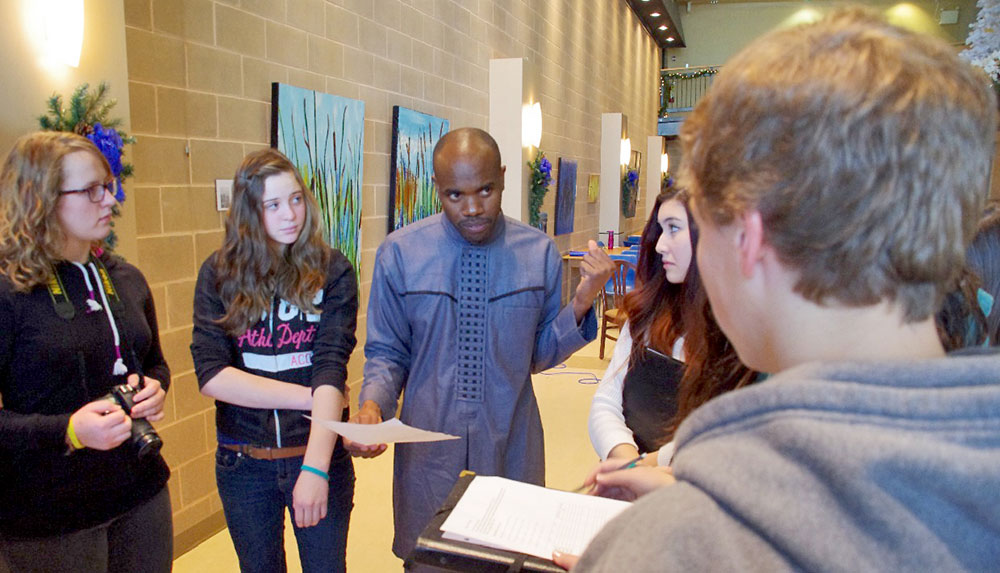Taking learning beyond the regular classroom, Mennonite Collegiate Institute (MCI) invited Mennonite Central Committee (MCC) on Nov. 21, 2013, as guest speakers engaged students in interactive workshops on interfaith dialogue, material resources, an introduction to MCC’s work, and peace in an African context.
“It is important to connect students to MCC’s work around the world, its efforts to aid in development, relieve human suffering, and be peacemakers where war disrupts and destroys,” said principal Darryl Loewen. “These experiences draw students into the life with MCC, planting seeds of ownership and involvement in its ministries.”
The day began with chapel, during which Steve Plenert, MCC Manitoba’s peace coordinator, shared an historical account of travelling Mennonites being hosted by a Muslim community. While he suggested that western media usually link the word “Muslim” with terrorist, he said that Mennonite history invites Mennonites to associate Muslims with kindness and generosity. These kinds of stories, he said, call Mennonites to creatively think about how they engage in peace work.
To explore more of those stories, and to hear more details about what that peace work can look like, students spent the rest of the day cycling through four interactive workshops.
A school staff member pointed out that students discovered, “Yes, MCC is thrift stores, but it’s so much more.” Even still, one of the most remarkable moments for staff and students was the discovery that more than $6 million of MCC Manitoba’s budget is covered by the province’s thrift store sales.
An even bigger highlight for students was Jimmy Juma, coordinator of the African Peacebuilding Institute in South Africa, who specializes in peacebuilding, trauma and reconciliation. Juma completed his doctoral studies on the reintegration of combatants into their home communities, specifically looking at child soldiers and their experiences.
In his workshop, “Peace in an African context,” Juma divided students into two teams, asking them to choose letter combinations that could win or lose them up to 20 points. At the end of five rounds, he grinned at both groups and asked, “Who won?” When the team with the most points started to celebrate, his grin spread as he asked, “Really? But you lost 10 points in the first round. What if your 29 points is just 29 chickens, but your 10 lost points are family members?”
“In war,” he said, “everybody always loses. But there is always a creative way to avoid it.” Indeed, had students chosen their letter combinations with both teams’ scores in mind, both teams could have increased their scores in each round.
Through memorable lessons like this, MCC Day helped students look thoughtfully below the surface: An enemy might actually be a host. A win-lose conflict can have a win-win solution. MCC can be so much more than a thrift store. And “Mennonite” can be so much bigger than just one school.
Teacher Daniel Tessmann summed up the day, saying, “Students got a broader perspective of the Mennonite commu-nity and the world today. They were asked: ‘What does it mean that we are Mennonite outside this building.’ ”
–Posted on Dec 24, 2013






Leave a Reply
You must be logged in to post a comment.